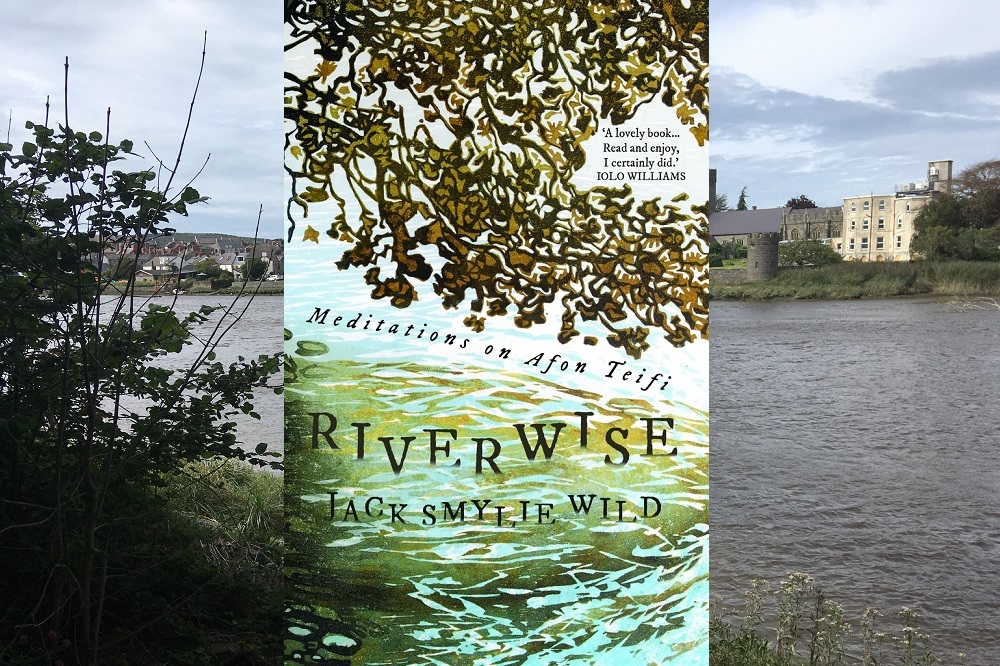Review: Riverwise – Meditations on Afon Teifi is a fine, absorbing and wonderfully attentive book

Jon Gower
If the American writer Henry David Thoreau learned about his place in the order of things by living on the edge of Walden Pond then Jack Smylie Wild did so by quietly splashing along the edges of the Teifi, striking his hammock among riparian trees to sleep under nets of stars, or setting a camera trap to capture the unseen comings and goings of herons and otters.
In this brief but bountiful book he traces Afon Teifi’s snakings, swellings and meanderings from its source in the glacial lakes called the Teifi Pools – set among bleached moor-grasses – to its eventual widening into Cardigan Bay. Along the way one of Wales’ longest rivers is fed by some sixty tributaries and three of these emerge as places of deep importance to the young writer, complementing and deepening his regard for the main river and the way it feeds into his own life, both nurturing and sustaining him.
At the beginning of this charming book, he cautions the reader that no one will teach you your land – ‘not in its full, hidden charm; not in the secret ways it can become your own; you must journey out, alone, seeking those forgotten places where pieces of your total self dwell.’
The rewards, he intimates, are substantial, nothing less than acquainting yourself ‘with that vaster body, or being, which you, in small but glorious part, form.’
Abundance
Riverwise is shot through with such sage advice and as you might guess from this quotation Wild is a joyful celebrant and patient observer of the river and its wide catchment and of the creatures that abide and abound there. His parents were hippies, part of that colourful caravan drawn to Wales by magic mushrooms, the dream of a good life and the self-sufficiency bibles of writer John Seymour. The Wilds lived in an old brown and cream Bedford ambulance halfway up a hill and their spirit and philosophy of freedom were clearly successfully handed on to their son who has now traded life in caravans and trucks and ‘makeshift benders of hazel and tarpaulin’ for four walls.
He now earns a living as an award-winning baker, which explains, no doubt, his descriptions of hay bales lying like ‘pieces of sliced baguette, drying out in the vast fields under the August sky.’
While choosing to spend much of his time on the riverbanks alone he does introduce a sparse cast of characters who have also been influenced by the Teifi. He calls in to meet Lewi Thomas in Maesycrugiau, who chronicles the decline in fish stocks, down from fifty salmon in a season to just one, reminding one of a phrase used by writer Matthew G. Rees who described a comparable situation on stretches of the Wye as the ‘gasping exhaustion of the river.’
We also meet biker and wild man Greg who’s been living in an old school bus on Mynydd Bach for thirty years and get to compare his relationship with the place with that of the poet Gwyn Williams. But these vignettes are rare exceptions in a book which is, in the main, unpeopled, other than for the author, quietly attending the river’s university. Not that that means a lack of life, far from it. There is an abundance of things to see: solidly ancient things and small wriggling ones:
“I stand by a cathedral of an oak, its great arms raised to the heavens, its fingers unfurling a thousand new prayers of green. Stout nettles congregate at its feet. In a rain-filled depression nearby, tadpoles journey in all directions: a Brownian motion of wriggling tails: life, pulsing in a puddle.”
Vivid
This isn’t the first time the Teifi has been celebrated. One thinks of Cardigan postman Idris Mathias who, along with his wife Beryl, spent nigh on twenty years collecting 1500 names for pools, overhangs and other riparian features on the Teifi which they reproduced on a 50-foot long map. Or the hyper-engaging television programmes of Moc Morgan, who fished the same reaches as Lewi Thomas when salmon and sewin scythed upstream more plentifully.
With this fine, absorbing and wonderfully attentive book, Jack Smylie Wild joins this roster of folk who know the river exceedingly well, and display that respect by the knowledge they have acquired, and their readiness to share it. So along the course of the book we find out why the author has no real aptitude for fishing, where the otters run and how Wild delights in poetry and can thus conjure up spring on the Teifi in a bright bouquet of words: ‘Soft rush, castles of bramble, and by the water, wild mint. To be out in the rain, toward dusk, in this field burdened by green.’
At the end of this vivid book, so charged with life and reverence and good nature, we are told that these quiet years spent on the riverbanks was also a time of healing for Wild. At the age of eighteen, he almost sent himself over the edge with psilocybin mushrooms, when he was already dealing with serious mental health issues.
In this regard, his book is an account similar to that of Richard Mabey’s ‘Nature Cure’ which also shows how a deep connection with place is good for both body and soul. As Wild puts it, ‘my wildest self knows that there is no experience more enlivening – more reverential of the raw, pulsating present – than simply immersing oneself quietly in nature… to witness with an open heart and mind the miraculous beauty and harmony of growing things, flowing things, glowing things.’
Riverwise by Jack Smylie Wild is published by Parthian. You can buy your copy here.
Support our Nation today
For the price of a cup of coffee a month you can help us create an independent, not-for-profit, national news service for the people of Wales, by the people of Wales.






